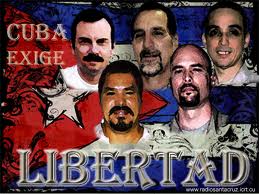Cuban Five

Since 2009, U. S. agent Alan Gross has been serving a fifteen year prison sentence in Cuba for providing material support to the Cuban opposition. In the meanwhile, three Cuban agents have been incarcerated in the United States since 1998. The possibility of an exchange of prisoners exists. The case of Gerardo Hernández, one of the three Cubans sentenced to two terms of life imprisonment, lends itself particularly well to such a humanitarian agreement. Here, in 25 points, are the reasons why.
1. Following the collapse of the Soviet Union in the 1990s, the radical sector of the Florida-based Cuban exile community increased its terrorist attacks against Cuba. The tourism industry - a vital sector of the fragile Cuban economy - was a particular target. Bomb attacks resulted in dozens of casualties. Faced with the immunity these violent fringe groups were receiving from U.S. authorities, the Havana government decided to send several agents to the United States to infiltrate these criminal organizations and prevent the realization of further potentially lethal acts.
2. In June 1998, after gathering evidence about the terrorist activities of 64 exiles living in Florida, the Cuban government invited two FBI officers to Havana in order to present them with the evidence that it had accumulated. But, rather than arresting those responsible for these crimes, the FBI arrested the five Cuban intelligence services agents who had infiltrated the criminal organizations: René González Sehweret, Ramón Labañino Salazar, Fernando González Llort, Antonio Guerrero Rodriguez and Gerardo Hernández Nordelo.
3. Following a trial that has been denounced by many legal institutions for its numerous irregularities, the five Cubans nonetheless won their case on appeal from a three-judge panel of the Atlanta Court of Appeals. The tribunal found that they had not received a fair trial. The U.S. government, however, lodged an appeal and the Five eventually received a total of four sentences of life imprisonment, and an additional sentence of 77 years. On October 13, 2009, the Atlanta Court of Appeals instructed the Florida court to modify the prison sentences for three of the five defendants. The review that was conducted resulted in Antonio Guerrero's penalty of life imprisonment plus 10 years being changed to 21 years plus 10 months, plus an additional penalty of five years of supervised release. On December 8, 2009, Fernando González' sentence of 19 years was reduced to 17 years plus nine months. In the case of Ramón Labañino, his sentence of imprisonment for life plus 18 years was reduced to 30 years in prison. Rene González and Fernando González were freed after serving their entire sentences.
0 comentarios